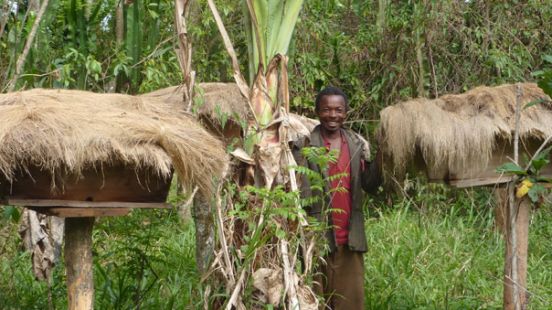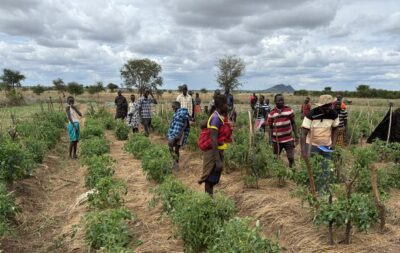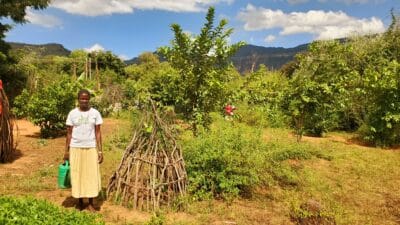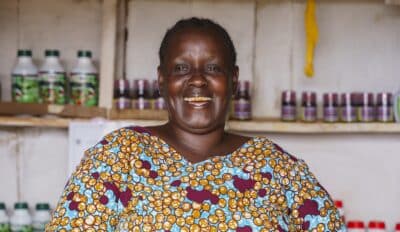Expert view
22 November 2013
Saving forests, changing lives

image: a beekeeper in the Bonga Forest, Ethiopia
By Nigel Harris, Chief Executive Farm Africa
I have a confession. When I first joined Farm Africa two and a half years ago, I didn’t really understand our forestry work. Helping farmers grow more crops by using better seeds and techniques made perfect sense. Linking farmers to markets to sell their crops and increase incomes – of course. But participatory forest management? Even the phrase didn’t mean much to me.
Since then I’ve repented many times of my ignorance. I’m deeply proud of our forestry work. In fact it just might be the most important work that Farm Africa does, with impact not just for people today but potentially for generations to come. And there’s nothing like seeing it in practice.
So here I am in Benishangul-Gumuz. Even experienced travellers to Ethiopia are unlikely to have passed through Benishangul-Gumuz. It’s a region at the far western edge of the country, bordering Sudan, with a local economy more than 90% dependent on agriculture. It doesn’t have the historic sites of Amhara or Tigray, and hence gets little tourist traffic. But like everywhere else in Ethiopia, it has its own beauty and great hospitality. The community we’re visiting today are swift to offer us food and drink. There’s no generosity like that of the poor.
Farm Africa’s work in Benishangul-Gumuz is only part of a huge expansion of our forestry work in four different regions of Ethiopia. Yet here alone the communities are now managing nearly 70,000 hectares of forest, having signed agreements with the regional government, who incidentally are so committed to the model that they’ve signed it into local legislation. Now that’s impact – not glamorous maybe, but much longer lasting than most development work.
I listen to Abudalaye, chairman of the local forest co-operative, here in Afabulder kebele or village. He talks about how the community can now protect its most precious resource – the forest – and still earn good money. Here they’re making honey, growing mushrooms, and have learnt to harvest the tall grass which can have real value – it’s great for making emergency shelters for example – rather than burning it as before to clear earth. They organise forest patrols to check there’s no illegal destruction going on. Anyone found breaking rules will be taken to the kebele court and warned or fined. They work on fire breaks too – fire is the forest’s sworn enemy and yet some communities still risk using fire to clear areas of land.
Zubeda, the vice-chair, takes over. Her expertise is running the local savings groups, one of Farm Africa’s areas of expertise. Some thirty women (women save much better than men) pay in small amounts of money and then lend back out to members of the group. These small loans, made for a month at a rate of 5%, allow the women to trade items from the village to the local town (and vice versa), turning a healthy profit. In a year the group has saved 5,000 Birr (around £170), of which 3,000 is interest. It’s been so successful that a second group has been started, with similar results. And each group has a social fund, which they contribute to separately, and which provides support such as medicine for members who get sick. Wonga might want to take note.
This is an area which globalisation has yet to touch, with the exception of the Chelsea badges on the local three-wheeler taxis. But at the end of the day it’s nature’s resources and the determination and mutual support of the communities that really count. Plus a little bit of expert training, support and leadership from Farm Africa.
Read Nigel’s first postcard from Ethiopia where he looks at our work supporting women to make an income from rearing goats in the northern region of Tigray.




